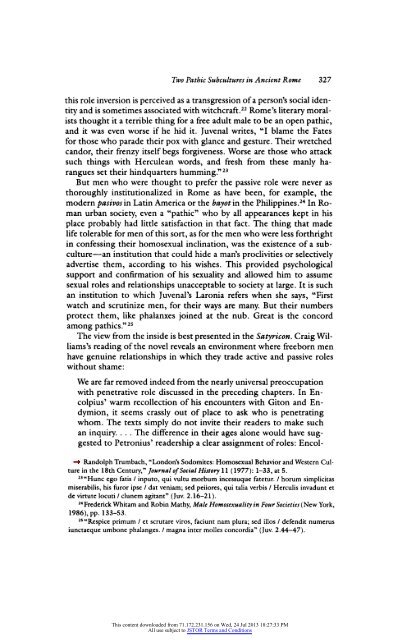Two Pathic Subcultures in Ancient Rome
Two Pathic Subcultures in Ancient Rome
Two Pathic Subcultures in Ancient Rome
Create successful ePaper yourself
Turn your PDF publications into a flip-book with our unique Google optimized e-Paper software.
<strong>Two</strong> <strong>Pathic</strong> <strong>Subcultures</strong> <strong>in</strong> <strong>Ancient</strong> <strong>Rome</strong> 327<br />
this role <strong>in</strong>version is perceived as a transgression of a person's social identity<br />
and is sometimes associated with witchcraft.22 <strong>Rome</strong>'s literary moralists<br />
thought it a terrible th<strong>in</strong>g for a free adult male to be an open pathic,<br />
and it was even worse if he hid it. Juvenal writes, "I blame the Fates<br />
for those who parade their pox with glance and gesture. Their wretched<br />
candor, their frenzy itself begs forgiveness. Worse are those who attack<br />
such th<strong>in</strong>gs with Herculean words, and fresh from these manly harangues<br />
set their h<strong>in</strong>dquarters humm<strong>in</strong>g'"23<br />
But men who were thought to prefer the passive role were never as<br />
thoroughly <strong>in</strong>stitutionalized <strong>in</strong> <strong>Rome</strong> as have been, for example, the<br />
modern pasivos <strong>in</strong> Lat<strong>in</strong> America or the bayot <strong>in</strong> the Philipp<strong>in</strong>es.24 In Roman<br />
urban society, even a "pathic" who by all appearances kept <strong>in</strong> his<br />
place probably had little satisfaction <strong>in</strong> that fact. The th<strong>in</strong>g that made<br />
life tolerable for men of this sort, as for the men who were less forthright<br />
<strong>in</strong> confess<strong>in</strong>g their homosexual <strong>in</strong>cl<strong>in</strong>ation, was the existence of a subculture-an<br />
<strong>in</strong>stitution that could hide a man's proclivities or selectively<br />
advertise them, accord<strong>in</strong>g to his wishes. This provided psychological<br />
support and confirmation of his sexuality and allowed him to assume<br />
sexual roles and relationships unacceptable to society at large. It is such<br />
an <strong>in</strong>stitution to which Juvenal's Laronia refers when she says, "First<br />
watch and scrut<strong>in</strong>ize men, for their ways are many. But their numbers<br />
protect them, like phalanxes jo<strong>in</strong>ed at the nub. Great is the concord<br />
among pathics."25<br />
The view from the <strong>in</strong>side is best presented <strong>in</strong> the Satyricon. Craig Williams's<br />
read<strong>in</strong>g of the novel reveals an environment where freeborn men<br />
have genu<strong>in</strong>e relationships <strong>in</strong> which they trade active and passive roles<br />
without shame:<br />
We are far removed <strong>in</strong>deed from the nearly universal preoccupation<br />
with penetrative role discussed <strong>in</strong> the preced<strong>in</strong>g chapters. In Encolpius'<br />
warm recollection of his encounters with Giton and Endymion,<br />
it seems crassly out of place to ask who is penetrat<strong>in</strong>g<br />
whom. The texts simply do not <strong>in</strong>vite their readers to make such<br />
an <strong>in</strong>quiry.... The difference <strong>in</strong> their ages alone would have suggested<br />
to Petronius' readership a clear assignment of roles: Encol-<br />
22 Randolph Trumbach, "London's Sodomites: Homosexual Behavior and Western Culture<br />
<strong>in</strong> the 18th Century," Journal of Social History 11(1977): 1-33, at S.<br />
23"Hunc ego fatis / <strong>in</strong>puto, qui vultu morbum <strong>in</strong>cessuque fatetur. / horum simplicitas<br />
miserabilis, his furor ipse / dat veniam; sed peiiores, qui talia verbis / Herculis <strong>in</strong>vadunt et<br />
dc virtute locuti / clunem agitant" (Juv. 2.16-21).<br />
24 Frederick Whitam and Rob<strong>in</strong> Mathy, Male Homosexuality <strong>in</strong> Four Societies (New York,<br />
1986), pp. 133-53.<br />
2sURespice primum / et scrutare viros, faciunt nam plura; sed illos / defendit numerus<br />
iunctacque umbone phalanges. / magna <strong>in</strong>ter molles concordia" (Juv. 2.44-47).<br />
This content downloaded from 71.172.231.156 on Wed, 24 Jul 2013 18:27:33 PM<br />
All use subject to JSTOR Terms and Conditions
















